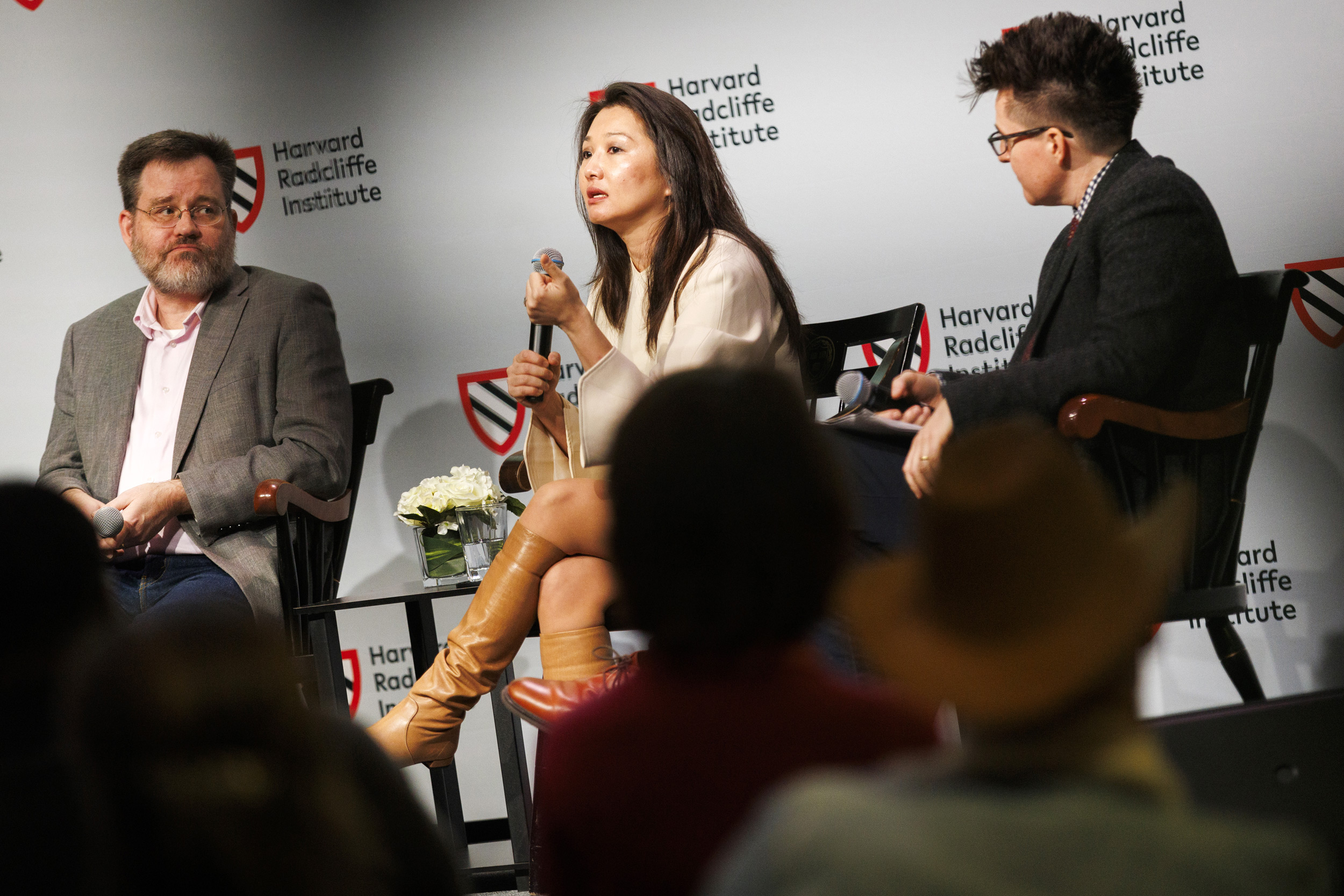
Radcliffe Dean Tomiko Brown-Nagin (from left), Nadine Strossen, Keith E. Whittington, Jeannie Suk Gersen, and Erica Chenoweth discussed the practical and legal challenges around speech policies on college campuses.
Photos by Stephanie Mitchell/Harvard Staff Photographer
Finding right mix on campus speech policies
Legal, political scholars discuss balancing personal safety, constitutional rights, academic freedom amid roiling protests, cultural shifts
The central question facing the nation’s college and universities, which have been roiled by protests since the deadly surprise Oct. 7 attack by Hamas on Israel, is not whether speech should be regulated, but how.
That was the starting point for a group of legal and political scholars gathered Tuesday by Dean Tomiko Brown-Nagin at Harvard Radcliffe Institute. The goal was to clarify how the law defines free speech and speech that can be regulated, and to discuss the balance that institutions of higher education must strike in creating policies that respect personal safety, legal rights, and academic freedom.
“Today’s challenges underscore enduring questions about the appropriate role of institutions of higher education during times of political and social conflict and how the mission, policies, and values of universities intersect with constitutional and statutory law,” said Brown-Nagin, the Daniel P.S. Paul Professor of Constitutional Law at Harvard Law School and professor of history at the Faculty of Arts and Sciences.
The Supreme Court has long held that First Amendment protections do not preclude institutions from imposing limits on speech. They “may, and indeed should, restrict” some types of speech provided they remain neutral and aren’t simply acting because they disapprove of its content, said Nadine Strossen ’72, J.D. ’75, professor emerita at New York Law School and president of the American Civil Liberties Union from 1991-2008.
The court has allowed limits on the time, place, or manner of speech, such as prohibiting disruptions in classrooms or libraries, or speech intended to incite violence. In addition, Strossen said, harassment or bullying, or statements so objectively offensive, severe, and intimidating that they deprive someone of an equal educational or employment opportunity, are also appropriately subject to restriction.
However, she noted, institutions are permitted as a general rule to sanction speakers only if they are making statements directed at specific individuals, not a general group, and their language must constitute what the Supreme Court calls a “true threat,” one that instills “a reasonable and objective fear” in another that they will be subject to physical attack.
“The more we expand what we think of and are willing to treat as disciplinable harassment, discrimination and bullying, the less space there will be for free inquiry and exploration of ideas,” said Law School Professor Jeannie Suk Gersen (center).

Besides considering limits to speech, higher education policies must also look to promote constructive, open dialogue. Many faculty and students say evolving social norms and campus speech policies of recent years have had a chilling effect on free expression that is stifling education and inquiry, according to Keith E. Whittington, a professor of politics at Princeton University, and Jeannie Suk Gersen, John H. Watson Jr. Professor of Law at Harvard Law School.
The two scholars lead the Academic Freedom Alliance, a national organization of college faculty who are pushing back on speech policies that limit academic freedom.
“The more we expand what we think of and are willing to treat as disciplinable harassment, discrimination and bullying, the less space there will be for free inquiry and exploration of ideas,” Suk Gersen said.
“Many of us, myself included, became concerned in the last several years” about “the slow erosion of academic freedom” that has “started to feel unbearable” in the last two years, she said.
It is “incredibly common” for students, “regardless of their political leanings, to say in the privacy of office hours, ‘I would never speak my mind; I would never raise my hand in class to actually express a viewpoint even if I know some who might agree because other people won’t agree with me and then I might be subject to some kind of shaming campaign or ostracized.’”
Teachers are changing course syllabi and eliminating topics such as gender, sexual assault, and racial discrimination. “But now, it’s too risky even if they’re not espousing any viewpoint,” Suk Gerson said.
The whole point of these policies is to ensure everyone has access to educational opportunities, said Erica Chenoweth, Susan S. and Kenneth L. Wallach Professor at Harvard Radcliffe Institute and Frank Stanton Professor of the First Amendment at Harvard Kennedy School. She said there have been “some egregious instances in which people have been bullied out of the institution” and harassed over their viewpoint or speech. “And so, there needs to be sort of a minimum standard so that everyone has access to the opportunities of academic freedom.”
Fostering a culture of mutual respect on campus will involve more than settling on a code of conduct everyone can live with, said Chenoweth, who led a Kennedy School working group that recently completed a two-year effort that examined ways to have serious, respectful conversations about divisive topics.
“And the answer is that you have to really intentionally build not just a culture of mutual trust and respect, but also the skills to have these types of conversations — to convene them, to facilitate them, and to recover from them,” said Chenoweth, who urges less confrontational debates and more small group discussions in intimate settings where people can offer their genuine views and concerns.
“At its core, the purpose of the University is to create new knowledge, to talk about ideas, and to prepare the next generation of leaders to go out and build a better world. I think that that means that we have a responsibility to practice that well here,” Chenoweth said.




